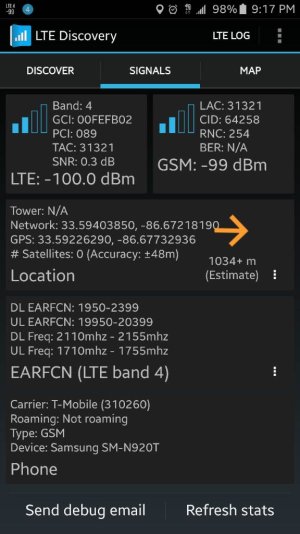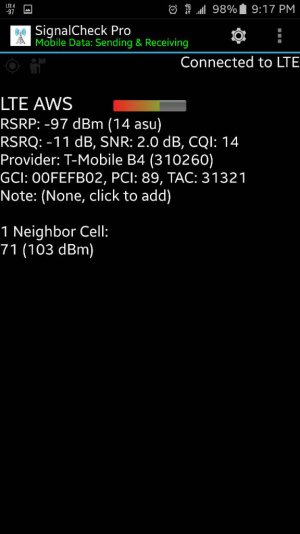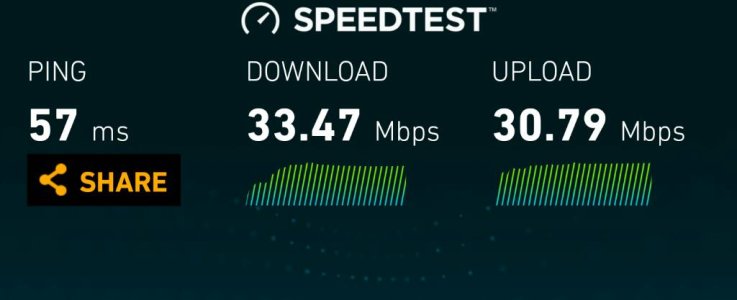It's not the security of the call, it's the security of the femtocell. As in lack of access control. I understand T-mobile wanting to make it easy to use and open and all, but that may be a good choice for a standalone house it's not a good choice for my situation (condo complex). Now, if the femtocell was voice-service-only (which one could reasonably expect, since one should be using one's own WiFi for data rather than the LTE off of the femtocell and thereby digging into their data bucket) then it might be a different situation, some
An LTE booster doesn't work when there's little to no LTE to even boost in the first place. The LTE booster I've got only picks up one bar in my bedroom off of the tower in that direction (and loses that periodically), and nothing from the tower covering the front of my condo. Anyone can connect to the booster also, but that doesn't bother me much as the booster goes to the tower for backhaul. The femtocell, on the other hand, uses my ISP. Which I don't want them tying up while I'm binging on Netflix and Hulu thank you.

The access security that others use is easy to use and open to whom you want it to be open to. Again, there is no confirmation from TMO they don't have that access control, TMO hasn't actually addressed that. People being able to connect and not having to log in to connect, is not a sign of open to all and no access control.
No one on my microcell list had to log in and would never know they connected to my microcell unless they happened to glance at the phone for the second that "AT&T Microcell" popped up on the status bar, instead of just "AT&T" on the status bar.
The LTE booster requires at minimum at 1 bar LTE signal, but sometimes you have to just try other windows to get a better signal to boost. Also moving around the other unit can make things better. I found that having my window unit downstairs and then putting my coverage unit upstairs, basically above it, gave me a much better signal.
Again, I understand and understood what you are saying about the access control. I was speaking in "all things being equal" with how femtocells work, you do have access control.
This is my LTE signal right now, off the booster, it isn't a really good signal, pretty bad signal with a lot of noise. This is OFF my booster. I've been having trouble with my booster, a lot of disconnects. They sent me a new booster a couple of weeks ago and it still had problems but started giving me an error message, the error message was my signal was too strong for a booster. Come to find out, they completed a tower near me. I'm in a "hole" massive, massive tree coverage and surrounded by so many towers in a 2-5 mile radius, there is a lot of interference. Yet.. My bad signal is too strong for a booster. If I was about half a mile down the road, the signal is much cleaner and my speeds are more than double. Before they completed the tower and I was on the booster all the time, this was about the speed I got on the booster, sometimes a bit higher. Off the booster, a maximum of 5 mbps download. The booster can do a lot with a very bad signal. My signal before the tower was completed a few weeks ago made this crap signal I have now, look very good. It was a horrible signal and would give me the same speeds. My coverage unit was always 8-9. Even my very bad signal that is now too strong for a booster, is decent. I'm going to experiment some and move my booster to some different areas in my house. If I still get the error message, then I'll send it back to TMO.
You might want to experiment with moving yours around too or if you have had it a while, see about trading it for a replacement. It seems the newer ones do not have to be as far apart from each other.
Maybe try the signal apps I used for these tests, see exactly what your signal is and make sure your signal is too bad for a booster. It could be needing to move it around or it could be lie mine, your actual signal has improved and with all the disconnects I was getting, it was making connections and speed look like my signal was still bad or worse. It wasn't, the problem was the booster didn't need to be connected, so my phone being connected to it and dropping and connecting to the tower and back to the booster, because the booster didn't need to be used, made it seem like I had a signal that was literally worthless.
I'm not saying take a cellspot with no access control, I wouldn't do that either unless I lived way out in the country. I'm still waiting for TMO to confirm about the access control, one way or the other. I can't imagine TMO would do no access control and if they do, I would think that will be something they need to and will end up, rethinking soon enough.
Also all things being equal as far as signal you would get, access control, like I said above, my choices would be in this order:
Booster
Cellspot
WiFi router





